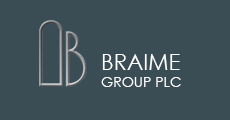CORPORATE GOVERNANCE
STATEMENT OF CORPORATE GOVERNANCE
At Braime we recognize that high standards of corporate governance underpin our continuing success.
Chairman's statement on corporate governance
We continually review the framework within which we operate and the processes implemented to ensure that they reflect the complexities of our business and, whilst acknowledging our size, are also capable of adding value as the business grows. The Company seeks guidance from the Quoted Companies Alliance, as set out in their 2018 publication, "The QCA Corporate Governance Code".
The board sets out the overall strategic direction for the group, regularly reviews management performance and ensures that the group has the right level of resources available to support our strategic goals. The board is satisfied that the necessary controls and resources are in place such that these responsibilities can be properly addressed.
Within the group we promote a culture of good governance in dealing with all key stakeholders: our employees, our customers and our shareholders. Pages 10 to 11 and 13 to 18 of the annual report describes our corporate governance structures and processes and how they have been applied throughout the year ended 31st December 2024.
Nicholas Braime
Chairman
As an AIM company, Braime Group PLC is not required to comply with the UK Corporate Governance Code (the 'Code') which applies only to fully listed UK companies and adherence to which requires the commitment of significant resources and cost. However high standards of Corporate Governance are a key priority of the board and details of how the Company addresses key governance issues are set out in the Corporate Governance section of this website by reference to the 10 principles of Corporate Governance developed by the Quoted Companies Alliance.
Companies need to deliver growth in long-term shareholder value. This requires an efficient, effective and dynamic management framework and should be accompanied by good communication which helps to promote confidence and trust.
Directors’ remuneration
Recruitment, appointment and termination of directors
Acquisition of new businesses
Disposal of existing business
Material restructure of operations
Purchase of land and buildings
Significant capital expenditure
Changes of shareholding or share structure
Change of auditors
Change of name of the group
Taking up of debentures and mortgages of existing business
Change of accounting year end
Introduction of bonus schemes
Strategic change - incursion into completely new areas of activity
Entering into, and settling litigation
Approval of the annual report
Approval of dividends to be paid by Braime Group PLC
Major changes to the group’s pension scheme
Changes to the Memorandum and Articles and Association
Consideration of conflicts of interest where permitted by the Articles
Approval of key policies (H&S, environmental, political donations, bribery etc)
Nomination committee
The company uses the whole board to consider matters of nomination and succession. The nomination committee ensures there is a robust process for the appointment of new board directors, and works to identify the skills, experience, personal qualities and capabilities required for the next stage in the company’s development, linking the company’s strategy to future changes. The nomination committee also discusses the appointment and replacement of senior management within the group.
Remuneration committee
The executive directors’ pay is subject to the decision of the whole board and not of a separate committee. Any significant awards to senior management are also discussed by the whole board. The company’s policy on directors’ remuneration is discussed in the director’s remuneration report in the annual report. The directors consider this is adequate for a group of this size.
Audit and Risk committee
The whole board formally receives presentation of audit and risk matters from the group’s independent statutory auditors at least once a year. The consideration of business risks is a standing item on the board’s agenda. The board considers that the size of the group does not justify an internal audit function but continues to assess the requirement for an internal audit function under review.
The directors are responsible for keeping proper accounting records which disclose with reasonable accuracy at any time the financial position of the group, for safeguarding the assets of the company, for taking reasonable steps for the prevention and detection of fraud and other irregularities and for the preparation of a Directors' Report and Directors' Remuneration Report which comply with the requirements of the Companies Act 2006.
The directors are responsible for preparing the annual report and the financial statements in accordance with the Companies Act 2006. The directors are also required to prepare financial statements for the group in accordance with International Financial Reporting Standards as adopted by the European Union (IFRSs) and Article 4 of the IAS Regulation.


